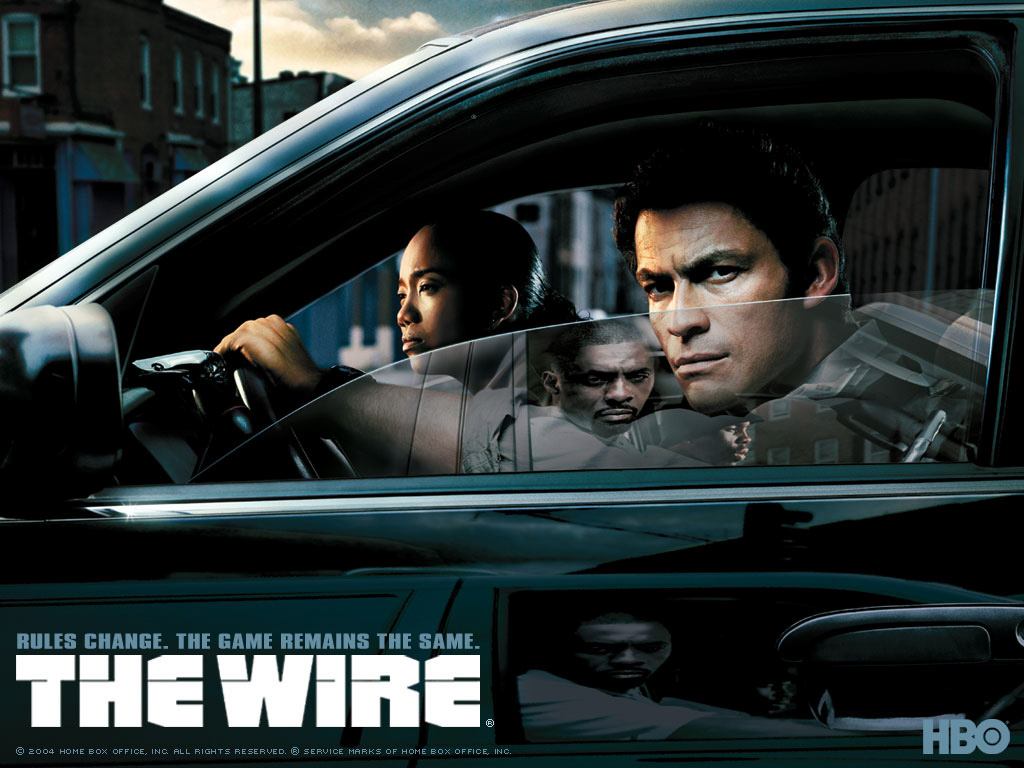
“It’s all in the game.” A game of treachery and murder. Good and evil. Right and wrong. A game that can tear a life apart, or build a life from the ground up. A game that can destroy a man for what he thinks is right, and propel him by doing what he thinks is wrong. A game that leaves good in the dust and lets evil roam the streets with a suit and a gun. A game with no rules but with laws that are made to be broken. A game of small fish in a vast ocean. “The Wire” tells a tale of a game with no ending, because no one wins.
“The Wire” is a story of connections, and the only way such a story could be told is through expansive and intertwining plot arcs. The series is separated into five parts, each with its own theme that somehow connects back to the War on Drugs. The first season is simple: cops and robbers. An introduction to our characters and an explanation of their motives and aims. A portrait of the world of policing and its almost endless corruption. The second season focuses on drug trafficking from across the ocean and tells the stories of unionized dock workers and the things they go through to survive. The third season mixes between the interworkings of the inner-city drug trade and its baffling connections to local government. The fourth season tells the stories of children in the inner-city school system, and their struggle to find themselves in a world ruled by drugs. And the final season attempts to wrap the series up through the view of tired and defeated journalists trying to kill the beast that was once Baltimore, Maryland.
In a matter of five seasons, “The Wire” creates an entire universe that seems too unbelievable to ever exist, despite its reality across America. It convinces an audience of unsuspecting Americans that their country hosts circuses of disarray and unimaginable corruption, and that powerful and realistic dialogue are the greatest tools for writers to make any comprehendible change. “The Wire” throws you right into the world of policing during The War on Drugs, which is why it takes some time for many people to accept the show. The first episode can seem so fast-paced and foreign that one might think the show must not be worth attention. But after watching the first few episodes, viewers will understand that the complicated dialogue is essential to the show’s realism, and by the fifth episode of the first season, names, locations, code words, and slang will become a second language to the audience.
The dialogue can vary from completely brutal and unfiltered commentary on the prejudices of humans and our uncontrollable indecency to incredibly clever and witty sex jokes. The dialogue shows us that detectives can be some of the most intelligent and hilariously self-loathing people in the business. It shows us the heart and brotherhood that goes into maintaining the structure of the drug trade. It shows us the loyalty and sense of survival that goes into drug trafficking. It shows us the senselessness that goes into murdering someone who was a friend a second before.
One scene in particular from early on in the series truly proves that the show is not only incredibly skilled at commentary, but is also an example of flat-out clever storytelling. Detective McNulty and his partner Detective William “Bunk” Moreland (Wendell Pierce) arrive at a scene of a homicide to reinvestigate a case that did not seem right. As they look around and examine the placement of bullet holes, they begin to realize the reality of the crime. However, neither character says any other word but “fuck” or some variation of the term. An entire scene, an entire subplot is developed that is investigated for the rest of the season. And the whole explanation doesn’t use any words besides “fuck” or some variation.
“The Wire” impresses in its understanding and development of vernacular. The white cops and black cops have slightly different grammatical traits and slang, and both of these groups vary drastically from those involved in the drug trade, or those working at the docks. Even one character, a caricature of a corrupt politician, speaks to his white constituents one way, and speaks to the black dealers he works with in a radically different way. The writers clearly know the varied types of people within this whole system. However, one could argue that David Simon and Ed Burns do not have the right to interpret how black people speak, and their unrestricted use of the n-word is unacceptable. On the other hand, because they have so much experience in Baltimore, and seem to portray it in such an accurate way, they are doing justice to the actualities of the situation, and therefore are justified in their writing of black dialogue.
“The Wire” has an intense dedication to content and reality. The show is exciting because it is real. The writing is encapsulating because it does not hold back. In a way, “The Wire” is one of the most important journalistic portrayals of injustice that has ever existed.
This article is the third installment of a multi-part “The Wire” review, and is also a part of a weekly column called “Revival Reviews.” (Click here for Part One and here for Part Two). The column is primarily focused on shows that have aired over the past 10 years and intends to explore shows that may have been too mature at the time of their premiere for current Wes students.


Leave a Reply